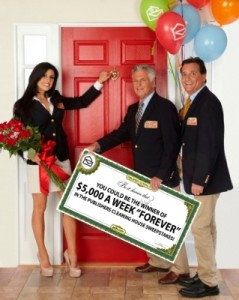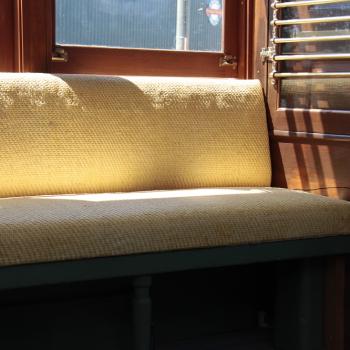 I just entered the Publisher’s Clearing House Sweepstakes. I’ve never done anything like that before. I’m sure it signifies some ominous line that I’ve crossed, some dubious group that I’ve joined (namely: “the time’s running out and I’m not rich” crowd). But I’m going to postpone any philosophical musings for the time being. I just hope like hell that I win.
I just entered the Publisher’s Clearing House Sweepstakes. I’ve never done anything like that before. I’m sure it signifies some ominous line that I’ve crossed, some dubious group that I’ve joined (namely: “the time’s running out and I’m not rich” crowd). But I’m going to postpone any philosophical musings for the time being. I just hope like hell that I win.
If you’ve ever actually torn open one of those envelopes—and I’m sure that few people who read a blog such as this one actually have—high-minded folks who’re interested in the arts and faith and the cross-section betwixt them—then let me tell you what it’s like (I’ll relate this in the fashion of a ten year-old boy who accidentally walked into the girl’s bathroom—a high school girl’s bathroom—and comes out with eyes full of stars and a heart full of tales from the undiscovered country from which he returns).
It’s not as easy as you think—to become a winner, that is. Sure, you can just return your entry in the enclosed envelope and be done with it. But there are all kinds of bonus prizes and award enhancements. If you find the place to put a series of stickers—on one of the twenty-five slips of paper that accompany the ballot—and if you play all the scratch-off games and tick-tack-toe games and assorted treasure hunt puzzles—you increase your chances to win five, ten, sometimes twenty-fold. This is serious business. The loaves and fishes are multiplied. Who can turn down a chance to maximize his winnings like that? It would be downright wrong.
Of course, there are lots of advertisements included in the envelope, which pester me: flyers for diabetic socks, for handheld cordless sewing machines, for ladies’ satin caftans, for talking rubber fish. I know they’re the whole point of the thing—that they pay for the prize money. But there are scads to sort through in search of the “Pot-of-Gold” sticker that goes on the upper left corner of the entry form, which must be matched with a series of purple and blue dots that correspond with my initials, all of which gets me an extra 10K for life, if I win. And I’m going to.
Sure, the odds are impossibly long—they state them in the fine print. But if there’s any justice, I should get it.
After all, I would do a lot of good with the money. Wouldn’t I give ten percent to charity? That’s tithing, isn’t it? That’s giving God his due.
But by ten percent I mean after calculating taxes, of course. And then I’d have to adjust for inflation and for unforeseen catastrophes that might occur. I’d have to be responsible, after all. A million dollars doesn’t go very far these days.
Plus, I have to make up for past losses in the stock market and in the horse business. I have to recoup those shortfalls. I also want to provide a legacy for my loved ones, so that will have to be saved back. Charity begins at home, you know.
So ten percent after all that’s taken out. Around ten, anyhow; somewhere near.
Come to think of it, there are other ways to tithe besides actually giving money. I could donate things that would both help others and give me joy at the same time. Who says that charity has to be painful? My time and talents, I’m often told, are as good as my treasures.
For instance, I can let others share in my bounty by promising to let them accompany me along the way. Oh, the things I would name after myself—a new sports complex at Ole Miss—for the athletes of course, and a skybox to watch them compete in every sport, in every campus stadium. I’d want to show my support; it would mean a lot to them. And I’d bring orphans to each game and people stricken with diseases. My largesse would be admirable. That’s giving back, too.
I would endow some scholarships, in my name, and set up a foundation, in my name. And while I’m at it, season tickets to all the Giants games as well. I’ll take an orphan with me; a different one every time. Photo ops abound. The children would be so grateful.
But I can’t be at peace over all this, it seems. There’s no rest for the potential plutocrat-philanthropist.
For I just got another envelope in the mail from the good folks at the Clearing House. And this one arrived with a warning. It means to unsettle me. Much is at stake.
Because while it’s true that I can absolutely double my prize by going through the same set of sticker-placement, puzzle-solving, and tick-tack-toe arranging as before, I’m cautioned in bold red- and-black all caps that:
FAILURE TO RESPOND AS DIRECTED WILL NULLIFY ANY LEGAL CLAIMS TO MONEY THAT COULD HAVE BEEN WON WITH THE PRIZE NUMBER ISSUED HEREIN.
I’m urged to open and take action at once, post haste.
The skybox slips away before my eyes; the naming rights to the stadium evanesce; houses, cars, boats—and all those disappointed orphans, gone.
What’s a man to do?
I tear into the envelope. A lot of people are depending on me. It would be selfish to stop now. A sin.
A.G. Harmon teaches Shakespeare, Law and Literature, Jurisprudence, and Writing at The Catholic University of America in Washington, D.C. His novel, A House All Stilled, won the 2001 Peter Taylor Prize for the Novel.











